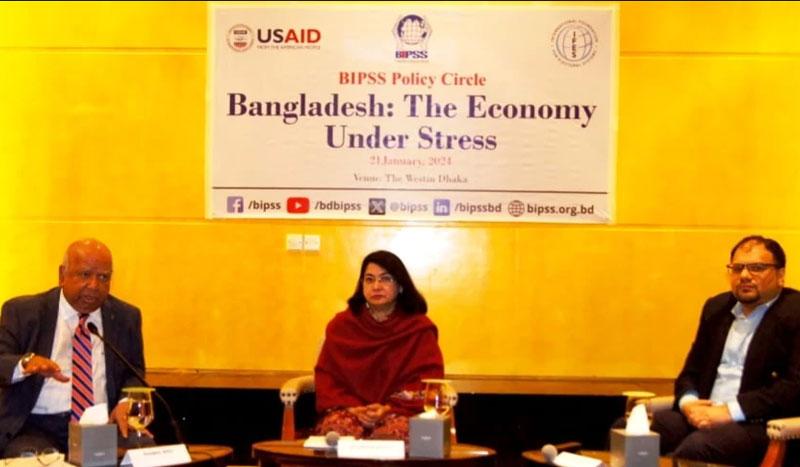Originally posted in UNB on 21 January 2024

Executive Director, Centre for Policy Dialogue (CPD) Dr Fahmida Khatun on Sunday provided an idea regarding the current picture of Bangladesh’s economy by stressing on the challenges at first.
She divided the obstacles that are currently being faced by the country’s economy into two types- short term or immediate term problems and medium or structural problems.
Dr Fahmida particularly mentioned the high inflation rate and low rate of foreign exchanges.
Bangladesh Institute of Peace and Security Studies (BIPSS) organized the policy circle titled “Bangladesh: The Economy Under Stress” in Dhaka.
The discussion focused on examining the present condition of Bangladesh’s economy and other associated factors.
Assistant Professor, Department of Economics, East West University Parvez Karim Abbasi also spoke at the event.
Major General ANM Muniruzzaman (Retd), President of BIPSS, moderated the event.
Foreign exchange reserve is declining in the country. In a question from the moderator if the declining foreign reserve might have an impact on the food security, Dr Fahmida said, saying that a decline in foreign exchange reserve will not only affect the food security but it will also effect the sustainability of the energy security.
Biman Dreamliner returns to Dhaka due to cockpit windshield crack
She pointed out that due to the Russia-Ukraine war, the supply chain has been disrupted globally and the condition of Bangladesh’s economy is no exception as it is integrated with global economy.
“Bangladesh has experienced and is still experiencing high inflation,” she said.
Dr Fahmida also highlighted that Bangladesh’s reliance on imports is exacerbating the current economic challenges.
She mentioned that in the last year the country has witnessed very little FDI which is not sufficient.
She cited that according to a research study conducted by CPD, 67% people surveyed in the private sector felt that corruption is the number one hindrance to doing good business in Bangladesh.
She even conveyed a sense of concern as both exports and flow of remittance in the country have been decreasing.
Again, she voiced apprehension about how the dominance of businessmen is being prevalent in the politics of the country and how good politics has ended overtime due to this.
Parvez Karim Abbasi focused on the issue of rising income inequality among the citizens of Bangladesh.
He brought up the point that the poverty rate affects 1 out of every 7 individuals of the country. This clearly shows a great disparity in terms of income level and wealth concentration.
Gas supply to improve in Dhaka, adjacent areas in a day or two : Nasrul
He also mentioned that the rising level of unemployment among youth is constraining the possibilities of upgrading the current economic condition of the country as substantial portion of the labor force of Bangladesh is made up of youth.
“Roughly 36% of our labor force comprises people between 18 to 30 years of age”, he said.
Parvez also underscored the significance of various other factors such as rising public debt, non-performing loans, systematic weaknesses in the banking sector etc. which are contributing to the decline of economic growth of the country.
In his opinion, focus should be on the RMG sector and increasing the flow of remittance as these two important sectors are in threatening condition.
The interactive session covered some critical assumptions and exchange of conversations among the honorable guests and the panelists including redefining poverty, ways to solve the economic stress, inflation and mega-projects.
Questions were raised about banking sector governance and how important it is to bring back discipline in this sector.
Concerns were also raised about the high volume of non-performing loans.
Bangladesh now has over 12.17 crore voters: EC’s latest draft update
The panelists felt that this should be curbed with proper regulatory mechanisms and controlled by the central bank. They also felt that one of the reasons for a lower flow of remittances is the fluctuations in the rate of foreign currency.
Muniruzzaman wrapped up the session by articulating that the current economic challenges can be overcome by ensuring accountability, transparency and establishing democratic governance.
Ambassadors and Diplomats based in Dhaka, former Bangladeshi Ambassadors, representatives from international and business organizations, academicians and journalists attended the event.

